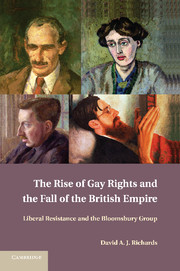 The Rise of Gay Rights and the Fall of the British Empire
The Rise of Gay Rights and the Fall of the British Empire Introduction
Published online by Cambridge University Press: 05 June 2014
Summary
Arguments for gay rights play an increasingly important role in the legal understanding of basic constitutionally protected human rights in many nations. This development has in turn given rise to controversies over the use of comparative and international law in arguments about gay rights. Conservative jurists and reactionary politicians have responded to this practice with hostility. Particularly vocal criticisms include Justice Antonin Scalia's dissent in Lawrence v. Texas (2003) or Zimbabwe's President Robert Mugabe's appeal to homophobia as based on distinctly African values. On the other hand, critics from the left have suggested that such international comparisons may involve a “we-know-best” subversion of local conceptions of justice, perhaps amounting to a form of imperialism.
My argument in this book is that there is an important connection between ethical resistance to imperialism and gay rights – indeed, that the rise of gay rights connects to and facilitates criticisms of imperialism arising from a democratic conception of human rights that, among other factors, leads to and prepares the way for the fall of empire, in particular, the British Empire. This thesis casts doubt on the claim that arguments for gay rights must be extrinsic to democracy and that they must reflect as well Western, as opposed to “African” or “Asian,” values. Gay rights could hardly be dismissed as extrinsic to a nation that takes itself to be a constitutional democracy if it is one of the forms of resistance that makes democracy possible. Although there are many important differences between ancient Greek and modern homosexuality, as we later see (Chapter 6), it is surely worth noting that the first important democracy in human history, that of ancient Athens, memorialized its founding by bronzes in the agora of the gay lovers Harmodios and Aristogeiton, whose resistance unto death to the attempt of a tyrant to seduce one of them was regarded in popular tradition as having freed Athens from tyranny.
- Type
- Chapter
- Information
- The Rise of Gay Rights and the Fall of the British EmpireLiberal Resistance and the Bloomsbury Group, pp. 1 - 10Publisher: Cambridge University PressPrint publication year: 2013


